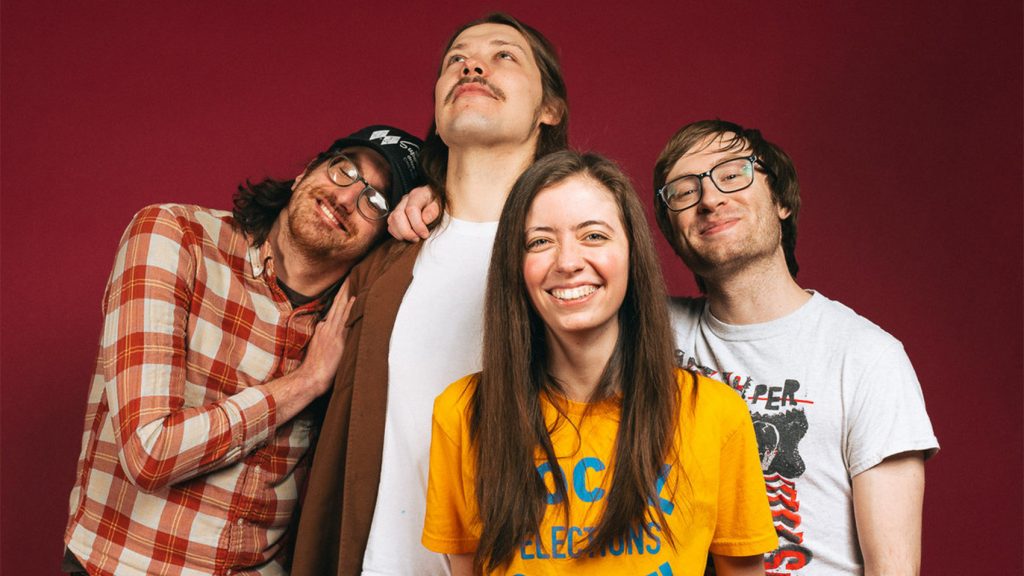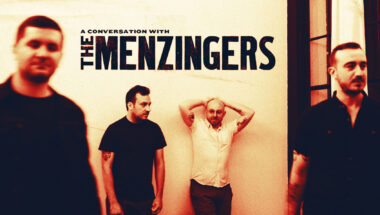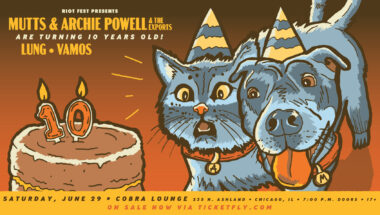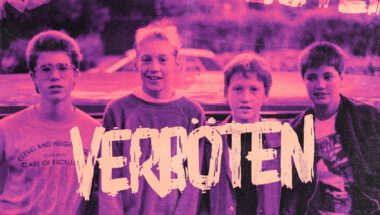For a while, the country-tinged Chicago indie outfit Ratboys’ greatest strength was live performance. Their stage presence and palpable camaraderie, fronted by lead singer and guitarist Julia Steiner, is effervescent and undeniably fun. Their 2020 album Printer’s Devil captures that energy in the recordings, pairing unconventional lyrical topics with rewarding musical payoffs.
Ratboys’ songs flaunt a flirtation with country, using slide guitar in tandem with traditional rock techniques to add nuance to their indie foundation. The band shares several virtues with 90s alt-rock; there’s a sense of homage to early Wilco (for whom they were slated to open last spring), with melodic hooks and satisfyingly full guitars that recall mainstream hitmakers like the Foo Fighters and Third Eye Blind, all while trading in emo consciousness. There’s an unpretentious joy within the arrangements—a willingness to lean into potentially corny musical tropes and dip out before going too far.
Lockdown started two days before the group was supposed to leave Chicago for the Printer’s Devil tour. Looking for something to occupy themselves, they turned inward to re-recorded their first EP, which expanded into a fully realized project: Happy Birthday Ratboy. After spending the past year broadcasting a “virtual tour” on Twitch—complete with a green screen that changed from Bikini Bottom to the moon—we’re lucky to have them take the actual stage at Riot Fest on Sunday, September 19. We spoke to Julia about her influences, the Chicago DIY scene, and what it was like to revisit decade-old songs after years of musical evolution.
I always think of the Ratboys sound as a little bit of 90s rock with a country twang. What was always playing in your house as you were growing up?
Yeah, that’s pretty spot on. I know that the four of us each had different things going on, but my mom was always playing Sheryl Crow. She was always one of my favorite songwriters growing up. I’m not sure if this really comes through in our music per se, but I grew up always a huge fan of Shania Twain and the Chicks. That was such a special time for women making incredibly catchy, but not cheesy, country music.
And, like, the Beatles, just a lot of music from my parents’ generation that my mom would just have on in the car and around the house. I remember when my mom saw that I was starting to take an interest in guitar, when I was 13, I don’t know if she got it for me but somehow I ended up with a Beatles chord book that had every song they wrote. That’s kind of how I started learning guitar. It was a great entry point because a lot of their songs are just three or four chords and a great melody. It gave me confidence that you don’t have to be a virtuoso to play a great song.
Absolutely. Did you take any lessons, or learn classically? Or did you just figure it out on your own?
Yeah, I took lessons for two or three months—definitely not classically or anything. [Laughs.] It was the son of my mom’s friend who just kind of sat there. I wasn’t very into it. It didn’t seem like he was super engaged. I kind of ended up just teaching myself. This was in 2006, 2007, right when YouTube was starting, before there were ads, before there were any rules. It was an exciting place to be. There were a ton of people teaching guitar for free and it was easy to just listen to songs over and over again and just pick out the chords. I have very little technical context for what is happening when I play guitar.
Three chords and the truth, as they say.
Exactly, exactly.
Had you guys thought of revisiting the Ratboy EP for a while, or was that a project mostly borne of the pandemic?
We had been thinking of doing something before COVID. My original idea was that we would re-record updated versions of those five songs on the A-side and then maybe the original songs on the B-side, to have a document of them. But then when COVID happened, just like everyone else we had a ton of time on our hands, so we started thinking, if we’re gonna make a 12-inch vinyl record, it’ll be cool to really fill it and make it an album. There were a few other old songs kicking around that we never fully realized as a band—especially “Collected,” which cries out for a full band rock treatment—and in the past they were just DIY recordings. So there was a collection of songs from the early 2010s that we felt great about revisiting.
I wanted to ask you a bit about reimagining the musical arrangements and production. I know you’ve talked about switching from acoustic to electric guitar for some of those songs. Did you ever think about altering any lyrics, or did you want to maintain the ethos of the songs as they were written?
Yeah, I definitely thought about it. I think it might have only been for “Collected” and “Have a Heart.” It’s funny because I wrote those songs for classes in college. I was able to submit them as assignments instead of writing papers, so I kind of crammed in a lot of information in those lyrics because I was trying to get points across to my professor, so they’re just very dense lyrically. And back then I didn’t have as much respect for “less is more” with lyrics. So I did think about how nice it would be to rethink them, start from scratch and make them more of a simple, digestible set of lyrics. But as I was working on it, I just wasn’t able to think of something that felt very authentic, that felt good to sing. Honestly I was pretty stoked with how not-cringey most of the lyrics were. And don’t get me wrong, there are a few songs of mine that I would not even consider bringing to the light of day. The ones we chose are ones I’m still pretty stoked on that we didn’t have to do much rehab on.
Yeah, it’s kind of amazing to hear Happy Birthday, Ratboy in succession with your other LPs. Despite the songs being a decade old, they fit right into your discography.
Hell yeah. I’m really glad to hear that. I was checking out the record last night before we talked and I’m stoked on it. We made some really fun decisions. We just had a lot of fun making this record. We were under no time constraints. We did a lot of it at home. It kind of reminded me of recording the original EP. We were trying different things and it felt like an extremely low pressure environment.
I feel like I can always hear the fun that you guys are having in the recording.
That rules.
I mean, your songs cover a multitude of topics, but even when exploring sadder content, most of them seem to maintain a really hopeful tone. Is that a conscious choice for you?
I don’t know if it’s conscious. I tend to follow the old trope of burying sad ideas, or at least obfuscating them with happier, light melodies or vibes. I don’t know if that’s a defense mechanism or if it’s just something fun to play around with. The song “Down the River” is a fucking huge downer if you really pay attention to the lyrics, but it’s always been one of our happiest sounding songs. I just don’t think that ever gets old. I love when I’m listening to a song and I realize that’s what’s going on. It’s a slap in the face in the funnest way. As a listener, I really enjoy that experience.
I call that “happy-sad.” The Cure, Bob Mould, Best Coast. They sound so upbeat sonically and then you get in there and it’s like, oh, bummer.
Totally. I don’t know if it’ll ever come really naturally to write a sad song that’s the saddest sounding song you’ve ever heard.
They’re fun in their own way, but I imagine they’re not as energizing to play live.
That’s true. And most of my songwriting instincts are to bring something in that’s more lighthearted if it’s getting too heavy. That’s just how I approach life in general.
I think of the video for “I Go Out at Night” as the perfect crystallization of the band’s ethos — kind of tongue in cheek, it’s super fun and feel-good, kind of campy. How did you guys develop that idea?
Yeah, man. I’m really glad that you like that one. That was so fun to make. Our friend who directed the video had the idea to film it around Halloween, and we thought it would be fun to film it at night because of the lyrics. I remember we were at a barbeque restaurant and the idea came together really fast: going on this big quest and running into all of these seemingly terrifying obstacles and then shining a light on them and realizing everything is actually okay, especially with your friends that give you strength. It helps you realize that nothing’s as big or dark as it seems.
Printer’s Devil feels like an album intended to be played live, and obviously that tour, including dates supporting Wilco, was cancelled because of COVID. During the pandemic, Ratboys pivoted pretty ingeniously to a series of virtual tours. How did it feel to play those songs intended for large spaces to a computer, and all of us watching at home?
Yeah, fuck. We were just doing whatever we could to keep ourselves entertained and occupied. We were scheduled to leave on tour March 14 and we had to pull the plug on March 12. Everything was prepped, we had all the merch, the oil was changed, we were ready to go. We happened to have a small green screen that our bassist Sean had used for a music video, and we ordered a small webcam online and taught ourselves how to use OBS. We’re extremely lucky because Dave, Sean and I live together, so we were able to put that together in person. It made me feel like everything was gonna be okay, no matter how long we had to wait it out doing wacky things in the basement, at least people were there to joke with us and go along with our shenanigans.
You’re right though, that was the reason that we made that record so forward-facing and dynamic. We really wanted it to sound like we do live, and we recorded almost all of it live with the four of us in a room. The goal was to have a record on the merch table at the show that you could go home and listen to as a memory of the show. It would sound like how we sound on stage. We were very conscious, as we kept getting tighter as a band and developing more confidence to turn it up a bit, that the records we had to sell at shows didn’t really sound like us anymore. So we wanted to have an artifact, a real souvenir of their night out and the special experience that we all shared. We’re still so excited to play those songs live. We’re picking up right where we left off.
I think that you totally accomplished that. I’ve seen you live before and it’s such a fun show. When I heard Printer’s Devil for the first time, it made me feel the way I did seeing you open for Soccer Mommy at Music Hall of Williamsburg years ago.
That would have been right when we finished recording Printer’s Devil. We finished and then immediately left for that tour.
I wanted to ask you about the Halloween telethon that you guys did in support of a couple of organizations. How did you get the idea to partner with Girls Rock! Chicago and the Equal Justice Initiative? Have you worked with them before?
We had never worked directly with either of those organizations. The idea for the telethon sprang from the fact that we were bummed we couldn’t have a Halloween party at our house since that’s something we like doing. And Halloween was on a Saturday in 2020, and it was a fucking full moon and a perfect Halloween, and of course no one could go out. So the idea was to have a Halloween party online, and if we were gonna get all these people watching and get these different bands to play, we could probably raise money for organizations and charities we care about. We thought it would be great to get two organizations that tackled different issues ideally on a different scale, so we wanted to find a local organization and a national one as well.
Locally, we went for Girls Rock! Chicago, which we’ve just admired and respected from afar ever since I moved here in 2014. We’ve gotten to play shows with different Girls Rock! camps across the country and I’ve gotten to see them at Wicker Park Fest, and they just do exactly what I love to see: they empower young girls and kids in general to be loud, and give them confidence to have a voice. I wish I could have done something like that when I was a kid. Equal Justice Initiative was different. I think my mom made me aware of the work they do tackling our racist criminal justice system, and it was great to learn more about what they’re doing. Luckily, they had been receiving attention in the wake of Black Lives Matter, and they were able to hop on a phone call with me about their initiative and then we broadcasted that during the telethon. It felt awesome to be able to widen the scope of what we wanted to contribute to.
I always think of you guys as a Chicago band, but I know you and Dave met at Notre Dame. How’d you end up in the city?
Yeah, Dave and Sean are both from the south suburbs and they both came up together in this really, really cool music scene down there that I feel there should be a documentary about someday. There were all these kids in high school playing this insanely catchy, unique, strange music, and all these bands sounded different from one another. NNAMDÏ was a part of that, and he had shows at his house. So as soon as we started making music together and wanted to play our first shows, that was where we went, back to the south suburbs. It was a no-brainer.
The city has such a special music scene. Chicago pride is so strong, and the communal aspect is such an important part of that—it feels like the kind of place you’d want to be making music, and making music with friends.
That’s exactly it. There’s a lot of open-mindedness when it comes to mixed bills, and a lot of promoters that are willing to book baby bands on their shows. For our first show, I literally just cold emailed a promoter and asked if we could book a four-band local bill at Subterranean and he was like, “Yeah, let’s do it.” It wasn’t clique-y or anything. I’m proud to be a part of it.
Playing Riot Fest is something that we’ve hoped to do for a long time, so it’s really cool to take that next step. It’s the first bigger festival in the city that we’ve played. It’ll be so cool to experience that day. We can’t wait.



